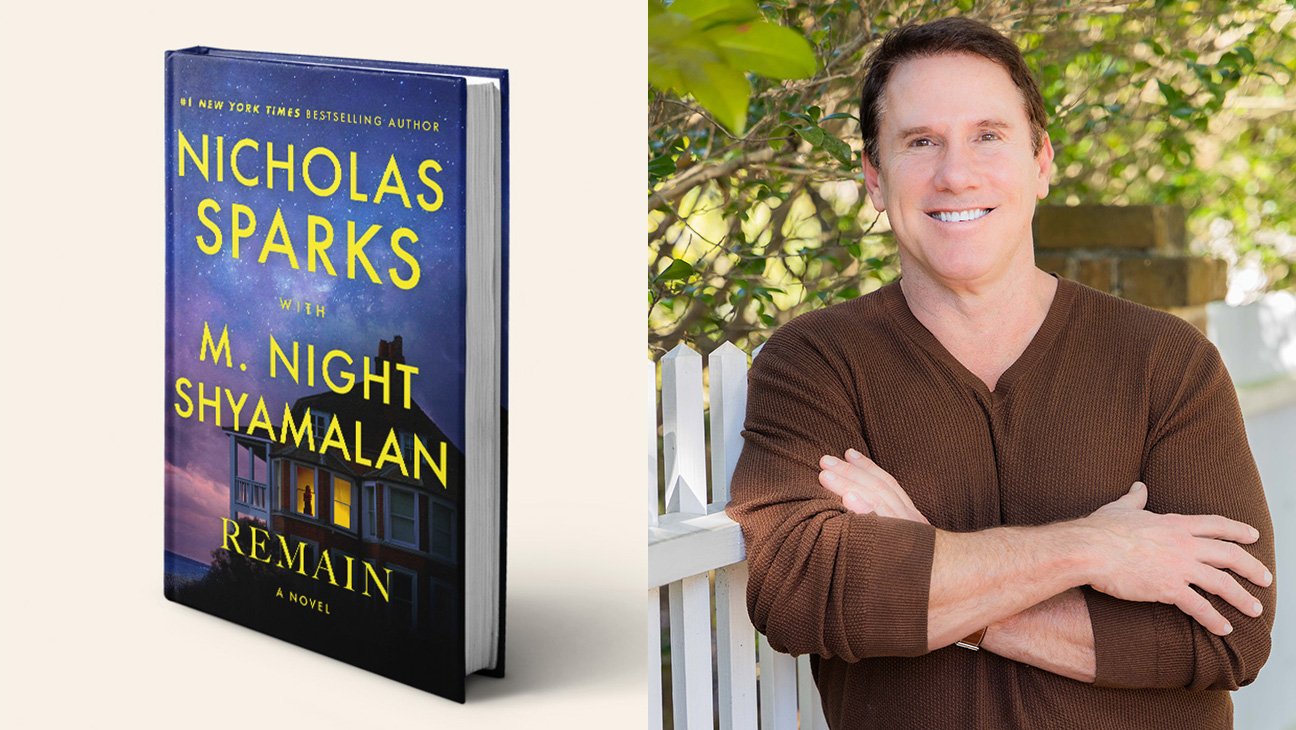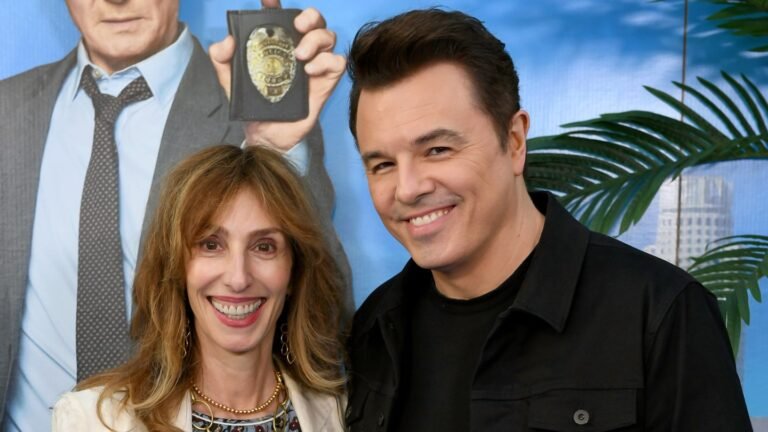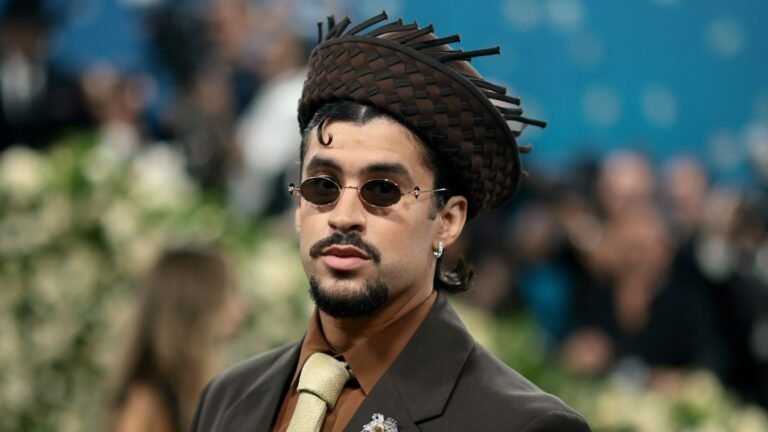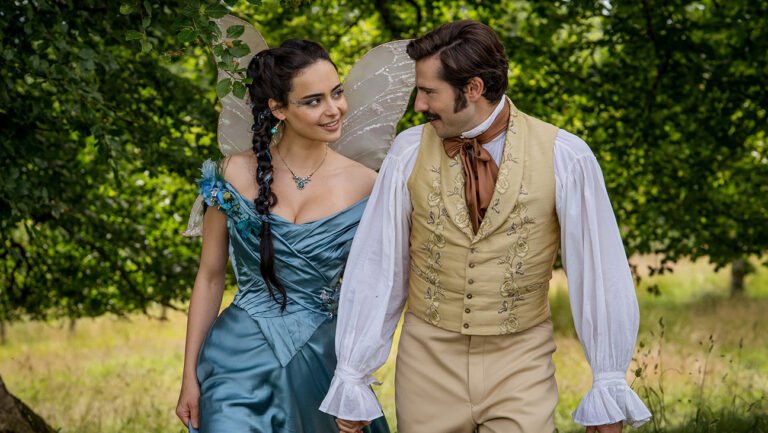Nicholas Sparks on Collaborating With M. Night Shyamalan for a Supernatural Romance With Scares and a Twist
Nicholas Sparks and M. Night Shyamalan are more similar than you think. And though joining forces for a novel may seem like a unique choice, the pair’s paths have crossed before. “Long time ago, when we had the original script of The Notebook that was written by Jan Sardi, the studio and I decided, ‘Hey,…
Nicholas Sparks and M. Night Shyamalan are more similar than you think. And though joining forces for a novel may seem like a unique choice, the pair’s paths have crossed before.
“Long time ago, when we had the original script of The Notebook that was written by Jan Sardi, the studio and I decided, ‘Hey, we’re going to get another writer, and we’re going to start from scratch. He’s going to revise it to the way we want it.’ One of the writers we went to was a young, largely unknown screenwriter. His name was M. Night Shyamalan,” Sparks told The Hollywood Reporter.
Though the now supernatural aficionado was approached to help write the script for The Notebook, Sparks says he passed because he was “getting ready to do other things like The Sixth Sense. You’ve got to give him his pass. It all worked out for him!”
However, years later Sparks and Shyamalan met again with the hopes to join forces on a project. When the author known for delivering epic love stories and filmmaker always up for a twist teamed up, they came up with a story that both were interested in telling in their respective mediums.
“We agreed to meet on the condition that each of us would come to that meeting with an original story that would work for both of our genres,” Sparks tells THR of how his collaboration with the director came to be.
After brainstorming and finalizing the bells and whistles for what would become their joint story, Shyamalan informed Sparks that he wanted to make the tale into a feature film. Meanwhile, Sparks ended up writing a companion novel that offered all the introspective storytelling a film couldn’t. Having each other as sounding boards throughout their creative process was a bonus.
“So it wasn’t really an adaptation. It wasn’t a novelization. It was both of us taking that original story we first conceived at the very first meeting, and then he worked in his medium, and I worked in mine. I gave him a real long leash on his medium, and he gave me a real long leash on mine,” Sparks explains.
That original story ended up becoming Remain, a novel out today from Random House, and an upcoming film starring Jake Gyllenhaal and Phoebe Dynevor.
The story centers on New York architect Tate Donovan, who is eager for a fresh start after losing his sister and travels to Cape Cod to design his best friend’s summer home. However when he takes up residence at a bed-and-breakfast, “he encounters a beautiful young woman named Wren who will challenge every assumption he has about his logical and controlled world.” Forging an immediate connection, the two begin learning about each other while helping free themselves from the darkness that has impacted their lives.
“Tate realizes that in order to free Wren from an increasingly desperate fate, he will need to unearth the truth about her past before time runs out … a quest that will make him doubt whether we can ever believe the stories we tell about ourselves, and the laws that govern our existence. Love — while transformative — can sometimes be frightening.”
Though the novel chronicles a blossoming love story, readers can still expect unease, scares and a twist that may or may not be the same in the film as in the book: “You have to read the one and watch the other to know exactly,” Sparks teases.
Ahead of the release of Remain, Sparks spoke with THR about collaborating with Shyamalan, the “long leashes” they gave each other during the creative process and teases the film version of the novel starring Gyllenhaal and Dynevor.
***
When one thinks of Nicholas Sparks books they may not think of M. Night Shyamalan films and a collaboration may not be top of mind. Yet you’re both collaborating on a book and the adaptation of it with Remain. Talk to me about how this all came to be.
The idea was suggested that M. Night and I meet each other, and we agreed to meet on the condition that each of us would come to that meeting with an original story that would work for both of our genres, whatever that means. So my side, you might say, “OK, it’s gotta have a love story.” M. Night’s side, “We gotta have a twist. We gotta have something unexpected.” We had that meeting in his place in Pennsylvania. We decided in that meeting, we do his story, and we hammered out much of the elements of that story: who the character was, what he was doing, what happens, who the other characters are … things like that. Didn’t get everything, but got a big, big chunk of it. That was probably in May of 2023, then in August of 2024 he calls me up and he says, “This is gonna be my movie. I’m going to write it, direct it, produce it.” I’m like, “OK, I guess I have to write a novel.” He begins working on the script, and I get the script sometime around October, and I take the script, and I call him up, and I say, “This is great. It’s gonna be a great movie. [But it] ain’t gonna work as a book at all.” And so I said, “Let me tell the story the way it should be told in a novel.” So it wasn’t really an adaptation. It wasn’t a novelization. It was both of us taking that original story we first conceived at the very first meeting, and then he worked in his medium, and I worked in mine. I gave him a real long leash on his medium, and he gave me a real long leash on mine.
I think with your unique collaboration it’s worth noting the notable different genres you both explore but there can be similarities. You have also explored mysteries and thrillers in your stories. What do you think romance, mystery and thrillers have in common, and why do you think your respective backgrounds make for a good writing collaboration?
You know, here’s a great story. Long time ago, when we had the original script of The Notebook that was written by Jan Sardi, the studio and I decided, “Hey, we’re going to get another writer, and we’re going to start from scratch. He’s going to revise it to the way we want it.” One of the writers we went to was a young, unknown, largely unknown screenwriter. His name was M. Night Shyamalan. He was approached to write the script for The Notebook because he’d done this wonderful family film, and he passed. He was busy. He was getting ready to do other things like The Sixth Sense. It all worked out for him. But he was one of those original ones. Both of us are very interested in character, an ending that isn’t entirely expected [and] deep emotion. For him, he likes to sometimes explore darkness as an emotion, but I explore love as an emotion. In the end, it’s character, emotion, story [and] it’s “let’s make this interesting and have a twist at the end.” And, to me, we were more similar, because we’re both really focused on those elements that I think that make for a really great story, character and plot. We’re more similar than different, because we’ve been doing this a long time, and we know what works.
Remain is a story that both reads like a Nicholas Sparks novel that readers know with a love story but gives that notable M. Night feeling of unease and a little terror. How did you approach tailoring the same story but in your respective mediums?
Long leashes! When Night was doing the script, if he asked me a question, I would brainstorm with him. But I was never insistent. I would never say something like, “Oh, you need to do this” or “How about this?” And he may or may not take any of those. That’s how we went through the script. Then I do the novel, and I call him and I say, “Look, this isn’t going to work. I got to change some things.” Because in a novel, you’re allowed a lot more time for backstory. In the novel, I can do introspective things, so you want to put those together in a way that’s telling the same story. What we said to each other was, “You make the best movie you can, and you write the best novel you can.” It’s working with someone [with] long leashes, because we’re both clear on the story and we both wanted high quality, as good as we could make it while being a Nicholas Sparks story and M. Night story.
Even though there’s going to be differences, the foundation of the story and what you both felt was important and wanted to get across could be the same. What was the foundation? What were yours and his wants and needs for this story that you both shared?
I think the theme. The theme is: Only true love could save you. Then you have the details. Who’s Tate? What’s he doing in town? … And then, of course, [when] he [M. Night] reads the book, he’s like, “There’s a couple things in there I gotta put into the screenplay.” So that’s pretty much how it worked: easy, fun, no egos, lot of confidence on both sides. He’s great at what he does, and he’s confident. Then I know I can write a novel. We could literally talk at that level and come to a decision that we both agree on and we’re good with it.
This story was different because we know that even though Tate is determined to sort out what happened with Wren, we know early on that they aren’t going to necessarily ride off into the sunset together. Can you talk about crafting this relationship and a love story in which we already know their ending early on?
Sometimes knowing when the end is coming, it makes the moments even more powerful. That’s what Night and I tried to do in our respective versions of this particular story.
We learn Tate was treated for depression after losing his sister and recently discharged from a psychiatric facility and seemingly having to find his way and himself. We also meet Wren. We learn her fate early on, but she perhaps remains a mystery because we only know her through her moments with Tate. Can you talk about creating these characters and what you wanted to explore with them in this story?
We can explain things in our past but simply knowing why something happened isn’t enough to make him better. Knowledge isn’t enough to make him better. So what makes Tate better? Moving forward in love. With Wren, this explores the question: How well do you know anyone? I mean, we think we know people, but what’s going on between the ears at all times we never know. It was very much a reflection of reality. In the end, we make our judgments based on, how does one act when I’m with them, and what do other people say about them? And that’s how we make our judgments. So, to me, it reflects as much of a real world than other novels that I’ve written in which you’re in both of their heads and you really feel like you know them for sure. This a little closer to reality, despite being supernatural, and people fall in love in the real world all the time.
Anyone who knows M. Night Shyamalan, they know there’s this art of the twist in his films. That’s no different with this book and film adaptation that we’ll see. What was it like working on crafting the mysterious elements and a twist in novel form?
Yeah you had to be very careful. I think the most important thing to know was that Night and I, we knew what the film was going to be, and we had discussions about what we wanted [for] the novel. I said, “OK, how different do you want the ending to be?” And we explored that concept, and we came up with a decision, and we were both OK with this. Now I’m not going to say [whether] they are the same. I will tell you that the endings have some differences and you’ll have to see both to know what. You have to read the one and watch the other to know exactly. What I think people should know is that we were both purposeful, and we’re both on board with the decisions we made for both the film and the novel.
Remain is already being adapted with Jake Gyllenhaal and Phoebe Dynevor starring. Why were Jake and Phoebe the perfect picks for these characters?
When you start going through people who’ve been in my films, I’ve covered a lot of the big [names] … Channing Tatum, Ryan Gosling, Zac Efron … We’re running out of big name stars here especially for certain age groups (Laughs.) Jake was great! It was really magical the way that came on board. Night had literally just printed the script and he gets a call from Jake, and Jake said, “Hey, I’m going to be in New York. Let’s have lunch.” And they’re having lunch, Jake says, “I’d really love to be in one of your movies one day” and Night says “Well as a matter of fact…” He reaches into his briefcase and hands him this script. Jake had no idea that was coming. They hadn’t met. He reads it, I don’t know, within a day or two, he says, “I’m in!” When it came to Phoebe, Phoebe was one of three we were debating. She was terrific. They’re both amazing performers and they both did great, great work.
After having so many of your stories adapted and being involved in the adaptation process, how has that impacted the way you approach a new story whether it be in the story you brainstorm, how you tell the story, the characters, etc.? What did you learn from this experience?
I made a great friend. You know him, his family, they’re wonderful. I’ll always treasure that. That was worth it in and of itself. Writing can be very solitary, so it’s fun to work with someone and have that sounding board as you’re going along. I think both of us would say that that part was great. As far as changing what I do, I doubt it. From the very beginning, I’ve always tried my best within the context of what I do. Everyone knows it’s gonna be a love story. Everyone knows this, but how do I do everything else in a way that we haven’t necessarily seen it in film or on television or in other books before? That’s the real challenge. Whenever I’m thinking of a story, I try to make sure that they feel original, both as a novel, but also could it be a limited series? Could it be seen on television? Would it be original as a film? And a lot of stories might work as a book, but they may not feel original as a film. For instance, the best way to think of it is, I would never do a love story set on the Titanic. I just don’t think it would be original. … So once I have a story that feels original, [or] hey, this could be an original film, TV or book, OK, that’s the story I’m going to write. So that process won’t change, and it’s served me well.
***
Remain is available now.







